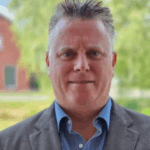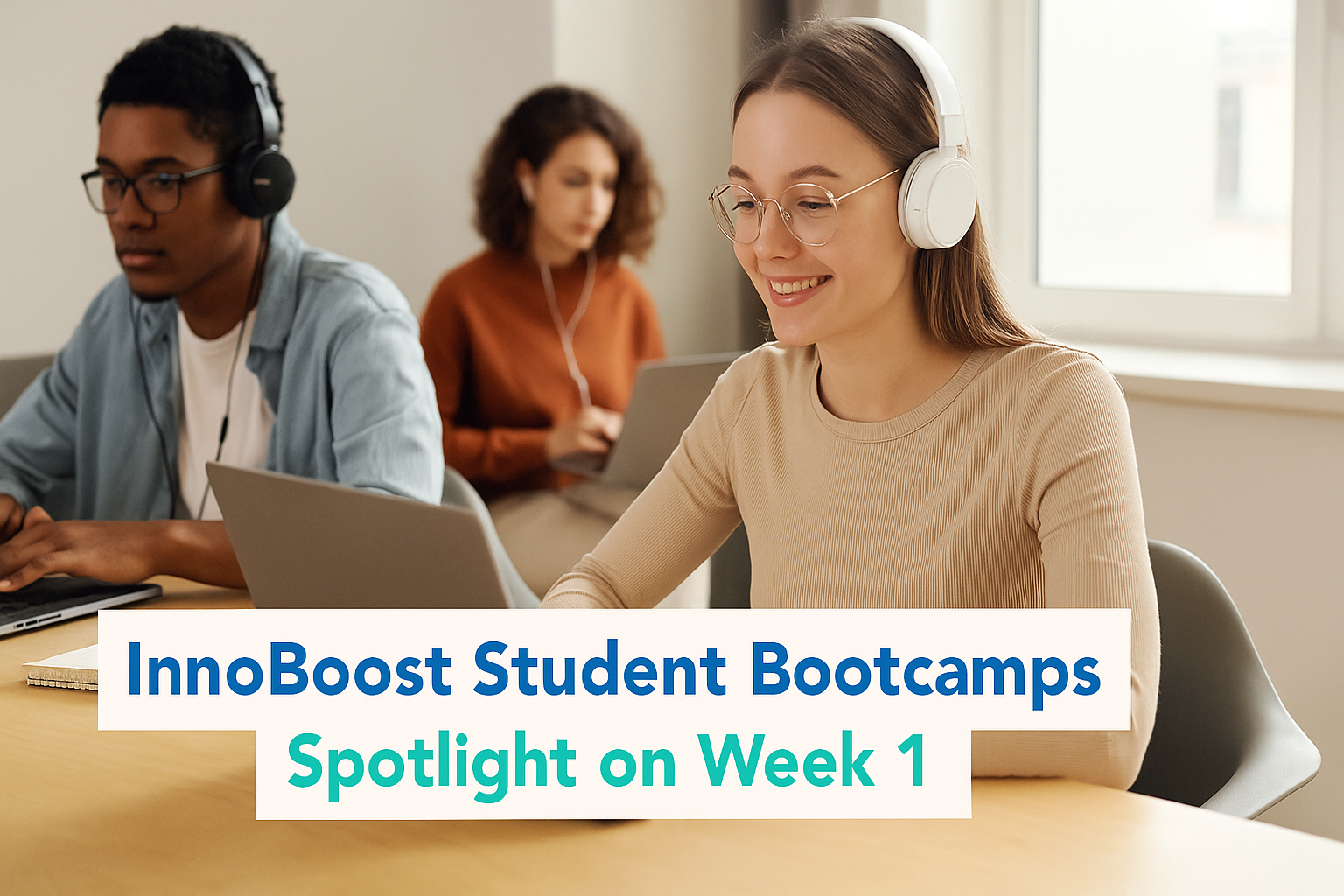Entrepreneurship goes far beyond writing a perfect business plan. It’s about mindset, resilience, and daring to disrupt. Week One of the RUN InnoBootCamp series for Students saw an international students from seven countries: the Netherlands, Ireland, Finland, Spain, Austria, Portugal, and Belgium benefit from a week-lonf workshop series with expert speakers from powerhouses of entrepreneurship education NHL Stenden and Vorarlberg University of Applied Sciences .
Let’s look back on the highlights….
What Is Entrepreneurship Really About?
The first online lecture was opened with the inspiring energy and insight of Hans Schülski, MBA, Chief Entrepreneurship Officer at NHL Stenden. He challenged students to think beyond business ideas and focus on attitude, persistence, and practical engagement as the foundation of entrepreneurship. Without an entrepreneurial mindset, building a sustainable business is nearly impossible. He cited Dutch entrepreneur Jitse Groen, founder of Just Eat Takeaway, as an example. For years, Groen earned very little, yet he persisted. With market insight, risk tolerance, and leadership, he grew Thuisbezorgd into Just Eat Takeaway, a multinational company worth billions. Schülski’s advice to students: “Successful entrepreneurship doesn’t start with a plan—it starts with the mindset to keep going when others give up.”
“Entrepreneurship isn’t just a good idea or a brilliant product. It’s about the right mindset. Without it, building and sustaining a business long-term is nearly impossible,”
says Hans Schülski of NHL Stenden.
Exploring Strengths, Defining Success


The week continued with lectures by Ewald Chocolaad, Lecturer in Management and Entrepreneurship, and Bauke Foppele, Community Developer, both from NHL Stenden. Ewald brought deep expertise in business economics, while Bauke shared his experiences in founding a startup and building a student entrepreneurship community.
Students were challenged to reflect on their strengths and weaknesses, gaining insights into how their personal traits could support their entrepreneurial journey. They were asked: Which entrepreneur inspires you and why? What qualities make YOU a good entrepreneur? How do YOU define success?
The session concluded with a task: students brainstormed financing options. In addition to traditional methods like venture capital and bank loans, they were asked to come up with at least five modern funding alternatives. The exercise highlighted the importance of financial literacy in building sustainable businesses.
Entrepreneurship as a Learning Environment
 Next up was John Hornby, researcher and lecturer at NHL Stenden, who shared how learning environments shape entrepreneurial thinking. His research identifies three key factors in entrepreneurial learning:
Next up was John Hornby, researcher and lecturer at NHL Stenden, who shared how learning environments shape entrepreneurial thinking. His research identifies three key factors in entrepreneurial learning:
Reflection emerged as the most important: it helps students turn experiences into skills.
Collaboration works best in bursts, especially in the early and middle stages of studies.
Authenticity requires fine-tuning: students must see the real-world impact of tasks—not just grades.
Hornby emphasized that entrepreneurial mindset acts as a bridge between the learning environment and entrepreneurial intent. Without it, assignments alone won’t lead to action.
Focus on Innovation and Game Theory
 In this stimulating workshop, Dr. Florian Maurer from Vorarlberg University of Applied Sciences in Austria approached entrepreneurship through economic theory and game theory. At the heart was Schumpeter’s concept of “creative destruction”: entrepreneurs don’t just create—they disrupt.
In this stimulating workshop, Dr. Florian Maurer from Vorarlberg University of Applied Sciences in Austria approached entrepreneurship through economic theory and game theory. At the heart was Schumpeter’s concept of “creative destruction”: entrepreneurs don’t just create—they disrupt.
On a macro level, innovations transform entire economies (e.g., Industry 6.0, AI).
On a micro level, entrepreneurs destabilize market equilibrium, forcing others to adapt or exit.
Maurer introduced four entrepreneurial archetypes from economic theory: Adam Smith’s calculating owner, Max Weber’s disciplined vocation-driven worker, Schumpeter’s visionary disruptor, and Israel Kirzner’s alert opportunity seeker. Game theory helps entrepreneurs analyze strategic choices: when to innovate, when to wait, and how competitors might respond.
From Sports to Startups – Chantal Stegink and Inge Visser

 NHL Stenden Community Coaches Chantal Stegink and Inge Visser guided students into entrepreneurial thinking through mindset and DISC profiles.
NHL Stenden Community Coaches Chantal Stegink and Inge Visser guided students into entrepreneurial thinking through mindset and DISC profiles.
Mindset: A growth mindset is key mistakes are learning opportunities, and challenges become possibilities.
DISC: Understanding one’s behavioral style supports collaboration and self-leadership.
Entrepreneurial Competencies: 15 skills that can be developed. Entrepreneurs aren’t born, they’re made.
Goal Setting: “A goal without a plan is just a wish.” Students created concrete development goals for themselves.
Inge brought in the perspective of elite sports: the mentality of top athletes’ resilience, training, and pushing limits, is directly transferable to entrepreneurship. It was truly inspiring to witness how motivated the students were responses flowed in abundance!
Explore all recorded sessions on innoboost.eu/run-innoboot-camp
What Is RUN InnoBoost?
RUN InnoBoost is a flagship initiative of the RUN European University alliance, designed to empower students with entrepreneurial skills, intercultural collaboration, and real-world innovation experience. The program brings together students from multiple European universities to work on future-focused themes such as sustainability, digital transformation, and inclusive entrepreneurship.
Through online lecture weeks, interactive workshops, and hands-on project work, RUN InnoBoost creates a dynamic learning environment where students can:
- Develop entrepreneurial competencies and mindset
- Collaborate across cultures and disciplines
- Explore innovative solutions to real-world challenges
- Gain practical experience in international teamwork
This is entrepreneurship applied, tested through projects, teamwork, and real-world challenges.
Sources: This blog is based on lectures and contributions from the following experts:
- Hans Schülski, MBA – Chief Entrepreneurship Officer, NHL Stenden
- Ewald Chocolaad – Lecturer in Management and Entrepreneurship, NHL Stenden
- Bauke Foppele – Community Developer, NHL Stenden
- John Hornby – Researcher and Lecturer, NHL Stenden
- Dr. Florian Maurer – Vorarlberg University of Applied Sciences, Austria
- Chantal Stegink – Community Coach, Entrepreneur & Senior Lecturer (DISC-certified)
- Inge Visser – Community Coach and ex-professional marathon speed skating athlete
Authors: Katriina Peuhkuri, M.Soc.Sc. (Master of Administrative Sciences). Project Specialist for RUN InnoBoost Häme University of Applied Sciences (HAMK), School of Bioeconomy (BIO unit), Orla Casey, Momentum



